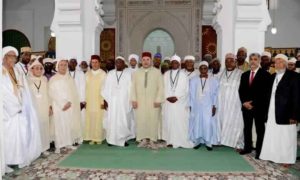
 Morocco’s King Mohammed VI chaired in Fez on Tuesday the installation ceremony of the Higher Council of the Mohammed VI Foundation for African Ulema, a new institution that will enhance further the special religious and cultural ties existing between Morocco and African countries.
Morocco’s King Mohammed VI chaired in Fez on Tuesday the installation ceremony of the Higher Council of the Mohammed VI Foundation for African Ulema, a new institution that will enhance further the special religious and cultural ties existing between Morocco and African countries.
In a speech he delivered during the ceremony, the King underlined that the Foundation is “an institution for cooperation, for the exchange of experiences and for the Ulema to make concerted efforts to fulfil their duty and turn a spotlight on the true image of the pristine Islamic faith as well as on its open-minded values, which are based on moderation, tolerance and coexistence.”
He said before the theologians and preachers from the 31 African Countries represented at the Foundation Higher Council that “the aim is to make sure those values help us promote security, stability and development in Africa.”
The Sovereign said he was confident that the Foundation, “through its branches in African countries, and together with other religious institutions, will play its role in disseminating enlightened religious precepts and in combating extremism, reclusiveness and terrorism – which our faith does not embrace in any way – but which are advocated by some clerics, in the name of Islam.”
The new institution was set up at the initiative of King Mohammed VI, Commander of the Faithful, who wants it to be a forum where Ulema from Morocco and other African States can discuss the Islamic thought and coordinate their efforts to disseminate the values of tolerant Islam.
King Mohammed VI explained that his decision to create this institution “has nothing to do with transient circumstances or narrow, passing interests.” “It is rather in line with an integrated policy to promote constructive cooperation and respond to the requests from a number of sisterly African nations in the religious domain.”
King Mohammed VI underscored further that the creation of the Foundation “reflects the depth of the time-honored spiritual bonds between sub-Saharan African peoples and the King of Morocco, Commander of the Faithful. Furthermore, it attests to the unity of our faith and doctrine, as much as to our shared cultural heritage.”
Islam was introduced to much of West Africa in the 11th century during the expansion of the Moroccan dynasty of the Almoravids and the King’s title of Commander of the Faithful is recognized beyond the borders of the Kingdom, especially in these countries following the Maliki doctrine.
The Foundation, the sovereign stated, “is another building block which further enhances our strategic policy designed to raise the level of political and economic cooperation between Morocco and a number of sister African nations in order to make it an effective, solidarity-based partnership, covering all sectors.”
The Foundation is entrusted with spreading tolerant Islam in Africa and fighting extremism and religious fanaticism through coordination with all African Muslims scholars. Besides strengthening Morocco’s historical ties with African countries, the Foundation will preserve and disseminate the shared Islamic African cultural heritage. It will be a platform for “Ijtihad” enabling Ulema, thinkers and scholars to exchange their viewpoints on religious matters and to ponder in depth on the Moroccan model as initiated by the King.
The Higher Council of the Mohammed VI Foundation for African Ulema is tasked with managing the Foundation’s general affairs. It deliberates on all matters of interest to the Foundation and takes all decisions enabling the institution to fulfil its goals, notably the definition of the general guidelines of the Foundation, the study and approval of the annual action plan, and the drafting of the Foundation’s budget and rules of procedure.
Besides Moroccan Ulema, the council musters theologians from Angola, Benin, Burkina Faso, Cameroon, Chad, Comoro Islands, Congo, Côte d’Ivoire, the Central African Republic, Djibouti, Ethiopia, Gabon, Gambia, Ghana, Guinea-Bissau, Guinea–Conakry, Kenya, Liberia, Mali, Mauritania, Niger, Nigeria, Sao Tome and Principe, Senegal, Sierra Leone, Somalia, Soudan, South Africa, Tanzania, and Togo.
And the new Foundation comes to confirm the efforts made by Morocco, as a global bastion of Islam’s moderate Sufi mystical strand, to ward off the threat of radicalization of its own citizens as well as of those of African countries.
